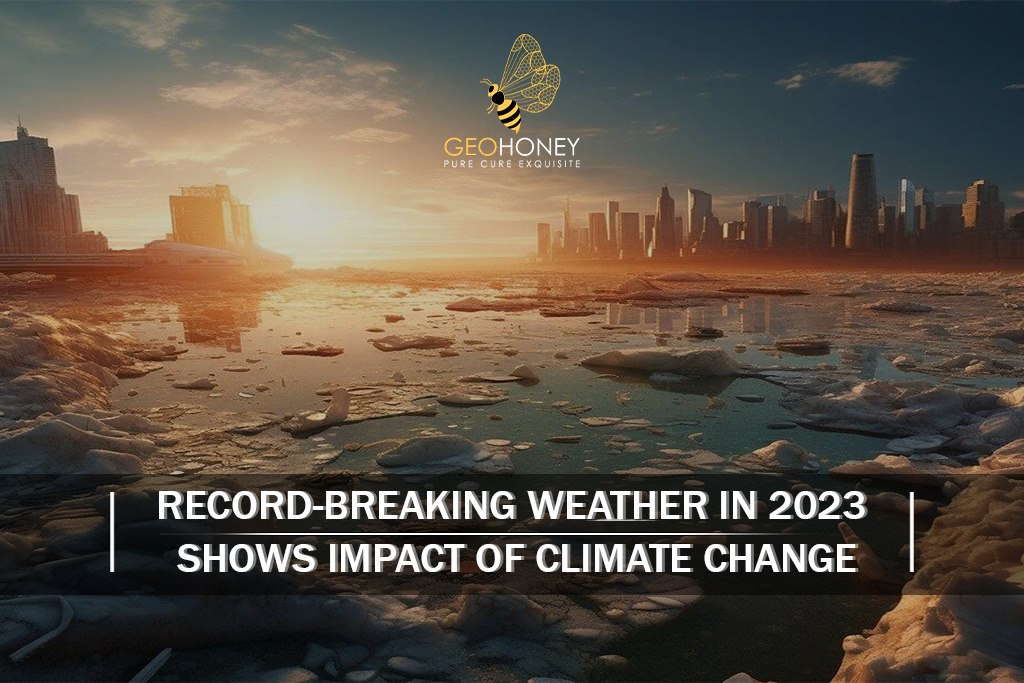- Tokyo: 14:56
- Singapore: 13:56
- Dubai: 09:56
- London: 05:56
- New York: 00:56
The Impact of Climate Change is Demonstrated by Record-Breaking Weather in 2023

"Life on Earth is under siege," said William Ripple, a distinguished professor of ecology at Oregon State University and one of the report's lead authors. The annual "State of the Climate" analysis seeks to present a concise and understandable assessment of the global warming impacts experienced during the previous year, as well as how we might reduce them.
One of the most surprising findings in this year's report was how hot 2023 has been. Prior to 2000, for example, the world average daily temperature never rose above 1.5 degrees Celsius (2.7 degrees Fahrenheit) above pre-industrial levels. Since the turn of the millennium, the planet has only seldom exceeded that temperature in a single year. By September 12, when data was collected, Earth had already experienced 38 days with daily average temperatures above 1.5 degrees Celsius, more than any other year.
The 1.5C barrier has become symbolic because governments agreed in 2015 to attempt to keep global average temperature increases below that limit and "well below" 2C. So far, the planet has warmed by about 1.2 degrees Celsius. According to research, the difference between 1.5C and 2C of warming is considerable. At 1.5 degrees Celsius, the Earth will most certainly have coral reefs and summer ice in the Arctic. Both will vanish at 2 degrees Celsius.
"Every 1/10th of a degree of warming that we can avoid can save a huge amount of suffering and will save many, many lives," he said.
The days that topped 1.5 degrees Celsius in 2023 were part of a larger pattern of record-breaking temperatures on land and in the ocean. This year's June and July were the warmest on record. July was not just the warmest month in over 170 years of records, but it is also likely to be the hottest month in over 100,000 years.
The El Nino phenomenon, which normally generates warmer weather, has been widely blamed for this summer's heat. But, according to Zeke Hausfather, a research scientist at Berkeley Earth who was not part of the analysis, it's difficult to explain 2023's high warming with merely El Nino. This "suggests one of two things," according to Hausfather. "This El Nino is acting differently than past ones. Or there are other things outside El Nino occurrences that are contributing to the unusual warmth we're experiencing."
Researchers have been looking into various factors, such as an increase in the 11-year solar cycle and a volcanic eruption in Tonga last year, which released an extraordinary amount of water vapour — another greenhouse gas — into the atmosphere. While each factor contributed to warming, "there still appears to be a bit of a gap there between what you'd expect with El Nio and underlying warming," said Hausfather. "The world is much warmer than expected and we're not sure why."
The frequency of mishaps increased this year as temperatures rose. The State of the Climate report provides a history of disasters, ranging from Canadian wildfires to tropical cyclones in Myanmar and severe rains in Japan and India, which caused landslides, floods, and deaths. "Some people are just starting to recover from one climate related disaster or extreme weather event and another is starting to take place," he warned. "There isn't even recovery time."
Climate change can exacerbate disasters, according to Christine Shield, a project scientist at the National Centre for Atmospheric Research who was not involved in the study. A drought followed by a series of strong rains, for example, can be disastrous since the dry earth is less able to absorb moisture, raising the risk of landslides and floods.
Nonetheless, even as the effects of climate change become more apparent, attempts to mitigate climate change lag. Global greenhouse gas emissions are rising in tandem with coal use, particularly in China and India. Similarly, Russia's invasion of Ukraine has aided certain European countries' energy shift away from fossil gas and towards renewables, but it has caused others to return to coal.
According to the research, the world's ongoing production of greenhouse gas emissions is also a matter of equity. "The Global South is much more vulnerable to climate change," Ripple said in a statement. "And that's a climate justice issue because most of the historical emissions have come from the Global North."
Source: moneycontrol.com



